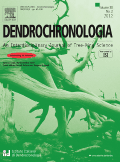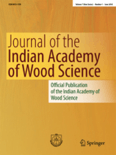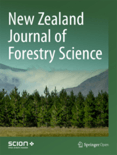
IAWA JOURNAL
Scope & Guideline
Elevating Research Standards in Environmental Studies
Introduction
Aims and Scopes
- Wood Anatomy and Structure:
Research exploring the anatomical features of wood, including cellular composition, growth rings, and vascular systems, emphasizing the relationship between structure and function in different species. - Ecological and Environmental Studies:
Investigations into how wood anatomy reflects ecological adaptations and environmental changes, including studies on the impact of climate on wood properties and tree growth. - Fossil Wood and Paleobotany:
Exploration of fossilized wood specimens to understand historical biodiversity, evolution of plant species, and geological contexts, contributing to our knowledge of ancient ecosystems. - Technological Innovations in Wood Analysis:
Development and application of advanced imaging and analytical techniques for wood identification and characterization, enhancing methodologies in wood science. - Cultural and Historical Aspects of Wood Use:
Studies examining the historical significance of wood in human societies, including traditional uses, cultural practices, and the impact of wood on historical records.
Trending and Emerging
- Impact of Climate Change on Wood Properties:
There is an increasing focus on how climate variables, such as temperature and precipitation, affect wood growth and anatomical adaptations, reflecting global concerns over climate change. - Functional Wood Anatomy:
Research is trending towards understanding the functional significance of wood traits, such as hydraulic efficiency and drought resistance, which are critical for predicting tree survival under changing environmental conditions. - Interdisciplinary Approaches:
Emerging studies are increasingly incorporating methods from other disciplines, such as molecular biology and ecology, to provide a more comprehensive understanding of wood biology and its applications. - Technological Advancements in Imaging Techniques:
The use of advanced imaging techniques, including X-ray micro-CT and 3D modeling, is on the rise, enabling more detailed investigations of wood structure and facilitating innovative research methodologies. - Wood in Sustainable Practices:
There is a growing interest in the role of wood in sustainable forestry practices and its applications in eco-friendly materials, emphasizing the importance of wood science in addressing environmental sustainability.
Declining or Waning
- Traditional Wood Identification Methods:
While wood identification remains important, papers focusing on conventional techniques have decreased as researchers increasingly adopt advanced methodologies such as spectroscopy and imaging technologies. - Basic Descriptive Anatomy:
There has been a noticeable decline in studies that solely describe wood anatomical features without linking them to broader ecological or functional implications, as the field moves towards integrative approaches. - Historical Wood Studies:
Research centered on historical wood uses and cultural significance has become less frequent, possibly due to a shift towards more pressing ecological and environmental issues. - Narrow Taxonomic Focus:
Papers concentrating on a limited number of species or genera have waned, indicating a trend towards broader comparative studies that encompass wider taxonomic groups.
Similar Journals

Scientia Forestalis
Innovating research to shape the future of forestry.Scientia Forestalis is a prominent academic journal dedicated to advancing the field of forestry and environmental studies. Established in 1996 and published by the Instituto de Pesquisa e Estudos Florestais (IPEF) in Brazil, this journal provides a critical platform for researchers and practitioners to disseminate innovative studies and findings in forestry. With an HIndex reflective of its academic impact and ranking in the third quartile of forestry journals, Scientia Forestalis is positioned to cater to a diverse audience, including scholars, professionals, and students engaged in agricultural and biological sciences. Despite its non-open access model, the journal maintains a commitment to high-quality research that fosters an understanding of forest ecosystems and sustainable practices. Published articles span a wide range of topics, ensuring that crucial developments in forestry science are captured and shared. The journal's current Scopus rank places it within the 26th percentile, affirming its role in shaping forestry research in a global context, making it an essential resource for anyone interested in this vital field.

DENDROCHRONOLOGIA
Pioneering Research at the Intersection of Ecology and Climate ScienceDendrochronologia is a prestigious journal dedicated to the study of tree rings and their implications for understanding environmental changes, climate variability, and ecological dynamics. Published by Elsevier GmbH in Germany, it has consistently reached high academic standards, holding a remarkable Q1 ranking in both Ecology and Plant Science as of 2023, demonstrating its significant impact within these fields. The journal aims to foster interdisciplinary dialogue through the dissemination of original research, reviews, and methodological advancements related to dendrochronology, appealing to researchers, students, and professionals who seek to deepen their knowledge of the interactions between terrestrial ecosystems and climate change. Although it does not currently offer an open access option, Dendrochronologia remains an essential resource for those in the scientific community, with valuable insights that contribute to the understanding of biodiversity and ecological resilience.

Journal of the Indian Academy of Wood Science
Cultivating Insights in Forestry and BiomaterialsJournal of the Indian Academy of Wood Science, published by Springer India, is a vital resource for scholars and practitioners in the fields of Biomaterials, Forestry, and Plant Science. With an ISSN of 0972-172X and an E-ISSN of 0976-8432, this journal has evolved since its inception in 2010 and continues to contribute significantly to the academic discourse until 2024. Notably indexed in Scopus, it holds respectable quartile rankings, including Q3 in Forestry and Q4 in both Biomaterials and Plant Science for 2023, indicating its niche yet impactful presence in the academic community. The journal aims to disseminate cutting-edge research, innovative methodologies, and practical applications regarding wood science and related fields. Researchers, professionals, and students are encouraged to engage with a plethora of studies that enhance the understanding and utilization of wood as a sustainable resource, making this journal an essential addition to their libraries.

NEW ZEALAND JOURNAL OF FORESTRY SCIENCE
Catalyzing Scholarly Dialogue in Forestry ScienceNEW ZEALAND JOURNAL OF FORESTRY SCIENCE (ISSN: 0048-0134; E-ISSN: 1179-5395), published by SCION, stands as a pivotal resource for researchers, professionals, and students dedicated to the fields of forestry, ecology, and plant sciences. With a strong commitment to open access since 2013, the journal promotes the dissemination of high-quality research and innovative practices within these disciplines, thereby fostering a greater understanding of the natural environment. The journal has achieved commendable rankings, being placed in the Q2 category in Ecology, Forestry, and Plant Science, reflecting its significant contribution to advancing knowledge and best practices in these areas. Based in Switzerland and published by SCION, a trusted name in forest research, the journal plays an integral role in shaping the dialogue around sustainable forest management and ecological conservation. As such, it serves as an essential platform for scholarly discourse and a valuable resource for anyone engaged in forestry and environmental studies.

WOOD SCIENCE AND TECHNOLOGY
Advancing the Frontiers of Wood Science and TechnologyWOOD SCIENCE AND TECHNOLOGY, published by SPRINGER, is a premier academic journal dedicated to the multidisciplinary study of wood and its applications. With a rich history spanning since its inception in 1967 and continuing through 2024, this journal plays a vital role in advancing our understanding of forestry, industrial and manufacturing engineering, and materials science. It enjoys an impressive categorization in the 2023 rankings, securing a Q1 status in Forestry and notable Q2 rankings in Industrial and Manufacturing Engineering, Materials Science, and Plant Science. Researchers and professionals benefit from its rigorous peer-reviewed articles, making substantial contributions to the field. The journal is actively indexed, ensuring high visibility and access to its content, which is essential for anyone looking to stay at the forefront of wood science research. The current impact factors and rankings affirm its significance, making it a critical resource for academics seeking to foster innovation and collaboration in wood technology and related disciplines.

MOKUZAI GAKKAISHI
Elevating Wood Research to New HeightsMOKUZAI GAKKAISHI, a prestigious journal published by the Japan Wood Research Society, serves as a critical resource for scholars and practitioners in the field of wood science and technology. With an ISSN of 0021-4795 and an E-ISSN of 1880-7577, this journal has been a pivotal platform since its inception in 1949, focusing on a broad spectrum of topics including wood materials, wood processing, and sustainable forestry practices. Although it does not currently offer open access options, its rigorous peer-review process ensures high-quality research dissemination. As researchers and professionals delve into the complexities of wood science, MOKUZAI GAKKAISHI stands out as an essential academic journal that informs, engages, and inspires innovative solutions in wood utilization and conservation efforts. The journal's historical significance and ongoing contributions make it a staple reference for anyone looking to advance their understanding of wood-related research and applications.

JOURNAL OF TROPICAL FOREST SCIENCE
Empowering the Future of Tropical Forest ConservationThe JOURNAL OF TROPICAL FOREST SCIENCE, published by the FOREST RESEARCH INST MALAYSIA, serves as a vital platform for disseminating research focused on tropical forestry. Since its inception in 1988 and transitioning to its current form in 1993, this journal has established itself within the academic community, currently holding a commendable Q3 ranking in the Forestry category, as per the 2023 metrics. With an ISSN of 0128-1283 and E-ISSN 2521-9847, it provides crucial insights into the ecological, economic, and social aspects of tropical forest management and conservation, making it an indispensable resource for researchers, practitioners, and students alike. Although it does not operate under an open-access model, the journal emphasizes quality and relevance in its publications, contributing significantly to the ongoing discourse in agricultural and biological sciences with a Scopus rank of #89 out of 174 and a 49th percentile position.

Drewno
Advancing the Frontiers of Biomaterials and ForestryDrewno is an esteemed, peer-reviewed Open Access journal dedicated to advancing knowledge in the fields of Biomaterials, Forestry, and Industrial and Manufacturing Engineering. Published by the Institute of Wood Technology in Poland, the journal has been an invaluable resource for researchers and practitioners alike since its inception in 2009. With an impact factor reflected in its notable rankings—Q4 in Biomaterials, Q3 in both Forestry and Industrial and Manufacturing Engineering—it offers a unique platform for disseminating groundbreaking research and innovative practices.
As a fully Open Access journal since 2021, Drewno ensures that its content is freely accessible, promoting widespread dissemination of knowledge within the academic community and beyond. Situated at the crossroads of engineering and biological sciences, it serves as a critical conduit for collaborative research and development. Researchers, professionals, and students are encouraged to contribute and engage with the vital discussions shaping the future of material sciences and sustainable forest management.

TREES-STRUCTURE AND FUNCTION
Advancing tree science for a sustainable future.TREES - STRUCTURE AND FUNCTION, published by Springer Heidelberg, is a leading journal dedicated to advancing the scientific understanding of tree biology through rigorous research and interdisciplinary approaches. With an impressive impact factor reflecting its high visibility in the scholarly community, this journal specializes in various aspects of tree ecology, physiology, and structure, making it a vital resource for researchers, professionals, and students engaged in forestry and environmental sciences. The journal holds notable rankings, placing it in the top quartiles of several categories, including Q1 in Forestry and Q2 in Ecology as of 2023, underscoring its relevance and influence in the field. Although it is not an open-access journal, TREES strives to disseminate critically important findings that contribute to our understanding of global forest ecosystems and their role in climate change mitigation. With a publication history spanning from 1986 to 2024, this journal continues to shape the future of tree research, providing a platform for innovative studies that inform policy, conservation, and sustainable practices.

Drvna Industrija
Advancing Knowledge in Forestry and Wood SciencesDrvna Industrija, a peer-reviewed journal published by the Zagreb University, Faculty of Forestry, serves as a cornerstone for research in the field of forestry and wood industry sciences. Established in 1980 and with a commitment to open access since 2006, this journal allows for a broad and unrestricted dissemination of knowledge, featuring original articles, reviews, and case studies that reflect the latest advancements in forestry practices and wood industry technologies. With its ISSN 0012-6772 and E-ISSN 1847-1153, Drvna Industrija is indexed in Scopus, holding a respectable Q3 quartile ranking in the forestry category, which places it in the top half of the field. As of 2023, it ranks 85th out of 174 in Agricultural and Biological Sciences with a 51st percentile, highlighting its relevance and impact in contemporary research. The journal's dedication to promoting innovative practices and fostering academic excellence continues to engage researchers, professionals, and students in Croatia and around the world, contributing significantly to the discourse on sustainable forest management and utilization of wood products.